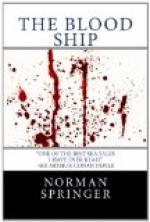“For she is safe so long as I am alive, and he cannot easily dispose of me so long as the crew is peaceful. You can understand that, can you not? Angus Swope is a fiend; he is more than half-insane from long indulgence of his cruel lusts. But he is cunning. I am a menace to his safety, and now he knows that she is also a menace. But he will not offer her violence or do her any harm while I am at large. By God, it would be his death, and he knows it. I give him no chance to strike at me alone and openly, so he is striking at me through the crew.
“For he must consider the attitude of his second mate. Lynch is her friend, remember that, Jack. He is an honest man. He is bluff and harsh and without imagination, as brutal a bucko as one is likely to find In any ship, but he is ‘on the square,’ as you put it. Also, he has more than an inkling of the true state of affairs in the ship. He knows who I am, and he guesses why the captain fears and hates me. I wish I could tell you what he has done, and is doing, in my—no, in her behalf. And in spite of his bucko’s code. He would not lift a finger to aid me in case of trouble (you remember the warning he gave us that day we were in the rigging) for he is an officer, a bucko, and I am a hand. But he would not stand for another such attempt at murder as Swope made the night we were aloft. He told Swope he would not stand for it, he would not keep silent. It was a brave thing to do, to defy such a master. This is Lynch’s last voyage in the Golden Bough, as he well knows. So our canny skipper set to work his crooked wits, and for weeks he has been fomenting a rebellion of the port watch. Mister Fitz is a more pliant and obedient tool than Lynch.”
I was excited, wide-eyed. For I was suddenly seeing a light. The words I heard were truth, I knew. It explained what I had seen and heard that night upon the poop. This trouble that threatened was made to order, to the captain’s order; even as Newman said.
“Good heavens—then Nils’ death—and the hazing”—I could not continue. The heartlessness, the malignant cruelty of the man who had ordered these things was too horrifying.
“Nils’ injury was unpremeditated, I believe,” said Newman, “but leaving him die without attention or nursing was a calculated brutality, designed to inflame the boy’s mates. Fitzgibbon’s bitter hazing, without distinction or justice, was for the same purpose. They kept a close eye upon the boy’s condition; they evidently figured that the hour of his death would be the hour of explosion. As you know, it very nearly was—only the parson’s courage averted trouble in the dog-watch, and but a little while ago I had to quiet a storm. But the danger is passed now, I think. The little fellow’s mates are naturally quiet, law-abiding fellows.”
“The squareheads may be kept quiet,” I said, “but how about the stiffs? How about Boston and Blackie?”




